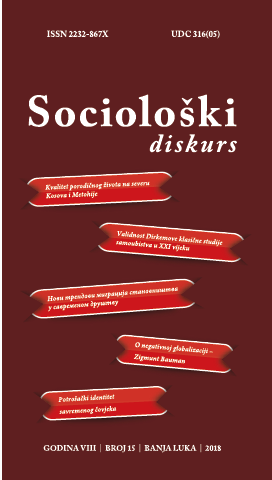Validity of Durkheim's classical study concerning suicides in the XXI century Case study - Bosnia and Herzegovina
DOI:
https://doi.org/10.7251/SOCEN1815025SAbstract
The goal of this work is a scientific description of Durkheim's notionof suicide and collected data concerning the number of suicide cases,
as well as the explanation of the suicide on the basis of overruling
social context or social factors. The starting point of this work is the
suicide issue as a global appearance which threatens to endanger public
health in countries worldwide, and therefore it conditions the need
for introducing multi- sector prevention strategies, as well as continual
researches. Therefore the research subject presents the validation
check on classical sociological standpoints concerning social causes
for suicide and specifically in the society of Bosnia and Herzegovina
at the beginning of the XXI century, in other words, searching for
the answer to the question-Can Durkheim's classic social study concerning
suicide explain the rate of suicides in Bosnia and Herzegovina
(further in the text referred as B&H) at the beginning of the XXI
century? Specifically, is the classic assumption of social conditioning
concerning suicide valid? In this work I used general scientific methods:
hypothetical- deductive, statistic and inductive, as well as a case
study for data gathering. The research outcomes derive from verified
classic assumptions about the causes of suicides in contemporary age,
as well as unveiling the socially influenced causes of suicides and the
possible measures for their prevention. The suicide rate in B&H at
the beginning of the XXI century confirms the assumption on social-
ly predestined suicide. The veracity of the raised rates of suicide in
peaceful rather than in war conditions was proven. The influence of
the economic stagnancy and age was also proven to affect the rates of
suicides in B&H at the beginning of the XXI century, and the assumption
on female resistance to suicide was validated as well.
Downloads
Published
2019-04-08
Issue
Section
Engleski
